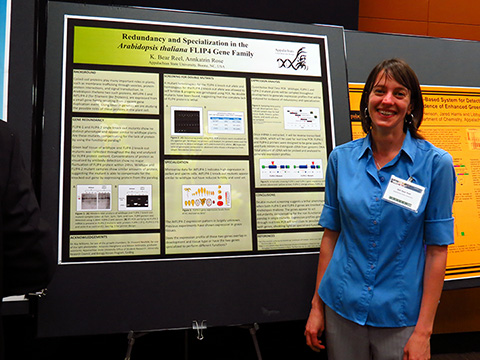 |
Dr. Annkatrin RosePlant Molecular Biologist |
||
|
COURSES |
Redundancy and Specialization in the Arabidopsis thaliana FLIP4 Gene FamilyKeri Bear Reel, Annkatrin Rose Coiled-coil proteins play many important roles in plants, such as membrane trafficking through vesicles, protein-protein interactions, and signal transduction. Our lab is investigating the functions of two such coiled-coil proteins in Arabidopsis thaliana: AtFLIP4-1 and AtFLIP4-2 (for Filament-like Proteins). These proteins are expressed from a small gene family resulting from a recent gene duplication event in the Brassicaceae lineage. We are using reverse genetics to study the possible roles of these proteins in the plant cell. AtFLIP4-1 knock-out mutants appear similar to wildtype plants but have reduced fertility and seed set, while single knock-out mutants of AtFLIP4-2 show no distinct phenotype. Analysis of RNA through reverse transcriptase PCR confirmed the lack of mRNA from the mutated gene in each single mutant. However, Western blot analysis showed that both single mutants produce similar amounts of FLIP4 protein as detectable with an antiserum against AtFLIP4-2. We have been unable to obtain double knock-out mutants from crosses, suggesting that the complete lack of FLIP4 protein is lethal and that the genes may be redundant in function and able to compensate for each other in the single knock-out mutants. Microarray data for AtFLIP4-1 indicates high expression in pollen and sperm cells as well as some expression in green tissues, which correlates well with the reduced fertility phenotype observed in AtFLIP4-1 knock-out mutants. The expression pattern for AtFLIP4-2, however, is still largely unknown. Does the expression profile of these two genes overlap in development and tissue type or have the two genes specialized to perform different functions? To further investigate this question, we will use real time PCR to examine their expression profiles in wildtype and single mutant plants. Wildtype plants will be used to determine the expression profiles of the two genes when they are both functional to test whether they have evolved specialized functions. Single knock-out mutants will be used to determine if compensation is occurring. The results of this study will shed light on the process of functional divergence and specialization of recently duplicated genes. Poster # 208 at the Science in the Mountains Meeting, Appalachian State University, NC, April 11-12, 2013.
This poster won third place for best undergraduate poster at the meeting. Congratulations to Bear! |
||
